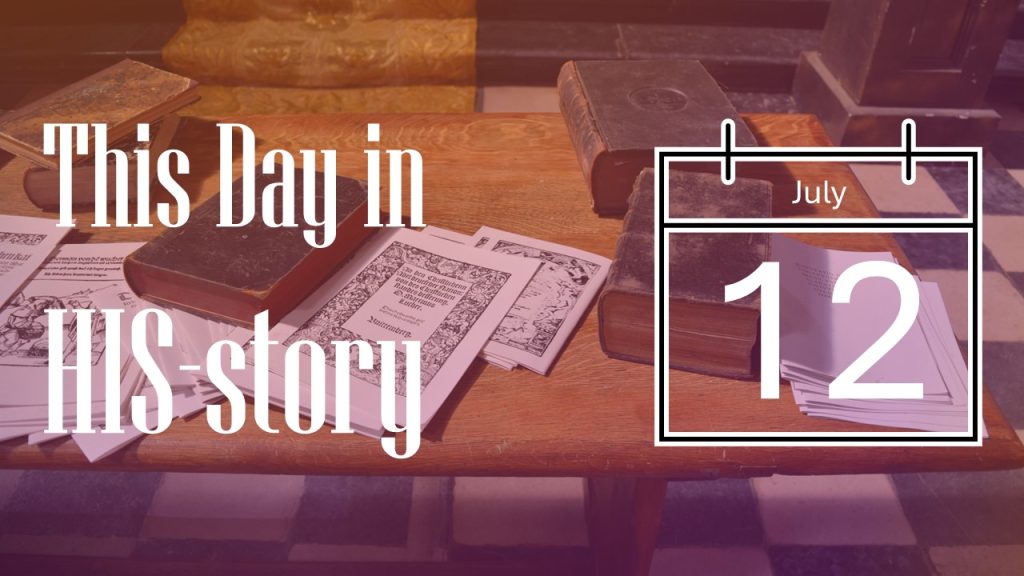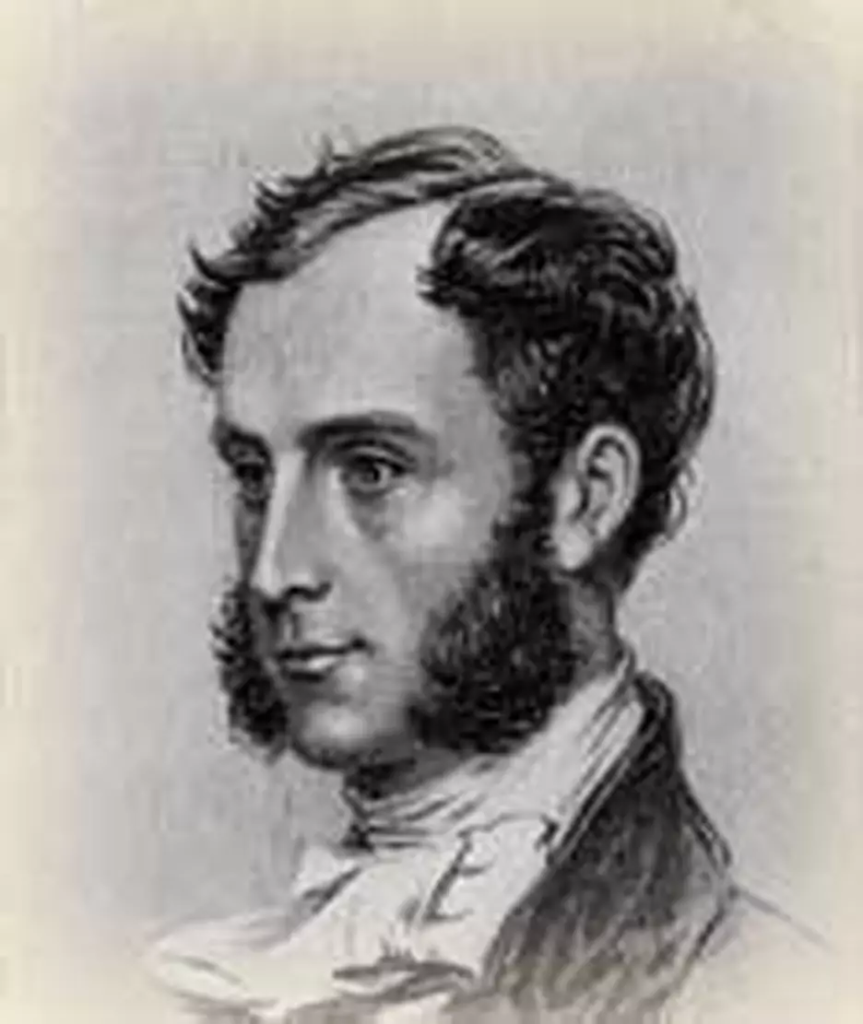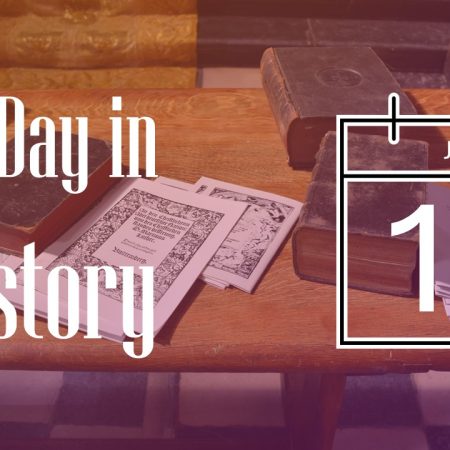
1739
David Brainerd lived only 29 years but the account of those years inspired many to follow Christ. Some, like William Carey and Henry Martyn, followed his footsteps onto the mission field.
At the age of seven David began to seek the Lord. His journal shows that he struggled greatly in coming to Christ. To replace self-righteous works by faith seemed to him very difficult to do. He found it hard to prefer God’s glory over his own salvation. Exceedingly scrupulous, depressive, and tubercular his physical health might well have aggravated his spiritual struggles.

David Brainerd found peace at last. It began with an utter sense of lostness. “One morning while I was walking in a solitary place (as usual) and came near a thick bunch of hazels, I felt at once unusually lost and at the greatest stand and felt that all my contrivances and projections respecting my deliverance and salvation were brought to a final issue.” From Friday morning through Sunday evening he was in the greatest agony of spirit, eventually feeling that the Spirit of God had quite left him. Here is his own account of his subsequent conversion on this day July 12, 1739:
“By this time the sun was scarce half an hour high, as I remember, as I was walking in a dark thick grove, “unspeakable glory” seemed to open to the view and apprehension of my soul. By the glory I saw I don’t mean any external brightness, for I saw no such thing, nor do I intend any imagination of a body of light or splendor somewhere away in the third heaven, or anything of that nature. But it was a new inward apprehension or view that I had of God; such as I never had before, nor anything that I had the least remembrance of it. I stood still and wondered and admired.” He came to want to exalt God above all things (as had Christ) and remained in great joy for about a week.
Brainerd proceeded to enroll and study for his ministerial degree at Yale. However, he was not allowed to receive the degree he earned, having commented that one teacher had no more grace than a chair. He swore he had no recollection of making the remark but, offered, nonetheless to apologize. This was refused. Three professors who stood behind him resigned and helped found Princeton.
David Brainerd was, nonetheless, commissioned by the Scotland Society for the Propagation of Christian Knowledge as a missionary to the Indians. He labored for about three years among several tribes until ill-health forced him to leave. Engaged to marry one of Jonathan Edward’s daughters, he was nursed in the preacher’s home and died there October 9, 1747. Edwards preached Brainerd’s funeral service and edited his journal with comments of his own under the title The Life of David Brainerd.
1803
He was the only father I ever had.” The boy was talking of Thomas Guthrie, a man who cared deeply for children.
Thomas Guthrie was born in Brechin, Scotland on this day, July 12, 1803. He was just twelve when he entered the University of Edinburgh. For ten years he studied a wide range of subjects, including medicine and science. After leaving school, he became a pastor.

At his first church, in Arbirlot, he not only taught the gospel, but doctored the sick and helped his people establish a savings institution.
When Guthrie transferred to Edinburgh, he was shocked at the bad behavior of the children. The population of the towns had shot far ahead of the “means of education and religious instruction.” Too often, the state-paid ministers were more interested in gambling, drinking and plays than in caring for souls. “There needs no other evidence of the fact that a lack of real faith exists among some who claim to be religious, than the cold, callous, and heartless indifference with which many bear the sins and look upon the sorrows of their fellow-creatures. They could not do so if they were baptized into the nature as well as the name of Jesus Christ,” wrote Thomas indignantly. [Some of the quotes in this story have been modernized.]
He made a tour of his district and reported appalling conditions. “I wandered…whole days without ever seeing a Bible, or indeed any book at all. I often stood in rooms bare of any furniture; where father, mother, and half a dozen children had neither bed nor bedding, unless a heap of straw and dirty rags huddled in a corner could be called so. I have heard the wail of children crying for bread, and their mother had none to give them…”
“I have known a father turn his step-daughter to the street at night–bidding the sobbing girl who bloomed into womanhood, earn her bread there as others were doing. I have bent over the foul pallet of a dying lad to hear him whisper how his father and mother –who were sitting half drunk by the fireside–had pulled the blankets off his body to sell them for drink. I have seen children whitened like plants growing in a cellar…when they cry they are not kissed but beaten…I don’t recollect of ever seeing a mother in these wretched dwellings bouncing her infant, or of hearing the little creature crow or laugh as he leapt with joy. There, infants have no toys; and mothers smiles are rare as sunshine.”
Thomas Guthrie opened “ragged schools” and fed the children who attended. He had a hand in every good work, fighting alcoholism, improving housing, calling for better work laws. He was one of the preachers who joined in creating the Free Church. Its pastors became directly dependent upon their people rather than living off the state as civil servants. When many were thrown out of their parsonages and suffered severely, Thomas raised over £100,000 (over $1,000,000 in today’s money) in less than a year to build parsonages for them.
In addition to his social work, he preached faithfully. Hundreds of lives were salvaged through the efforts of the godly man who was born this day.
1840
Young Frederick W. Robertson wanted to join the army. But his evangelical father urged him to enter the ministry and circumstances pushed the young man in that direction. He threw himself heart and soul into training. Later he would say, “It is not the situation that makes the man, but the man who makes the situation.” On this day, July 12, 1840, Frederick was ordained in the Church of England by the Bishop of Winchester who gave him this motto: “Endure hardship as a good soldier of Jesus Christ.” Filled with determination, Frederick became one of the greatest preachers of the nineteenth century England.

Oddly, he did not really fit in any one of the three parties into which the Church of England was divided. His intelligence and feeling, his love for tradition made him seem a natural ally of the High Church, with its emphasis on the centuries old Catholic tradition and its tradition of deep scholarship. His evangelical upbringing and his personal concern for soul-winning, made him seem a natural ally of the Low Church. Indeed, he loved the common people and preached his best sermons to groups of working men. But it was in the Broad Church that his independence of thought, love of the natural sciences and sympathy with social concerns placed him.
By “soul-winning,” Frederick meant getting a person to make a deliberate decision to follow Christ, followed by a conscious effort to live a Christian life and to join the fellowship of the church. His method was by preaching sermons that had direct application to the day.
For example, in preaching a sermon on Christ’s command to love–he said, “There are people who would do great acts, but because they wait for great opportunities, life passes, and the acts of love are not done at all. Observe, this considerateness of Christ was shown in little things. And such are the parts of human life.” He went on to describe a girl who made others happy simply by her smile and by anticipating what others would need.
As a preacher, Frederick was noted above all else for trying to get into the skin of Bible characters. Why did they do what they did? It was this which he tried to pass on to those that he taught. He worked hard, researching his sermons and preaching them only when he was sure he had the true meaning. Preaching the truth was far better than refuting error, he believed. “It is an endless task to be refuting error. Plant truth, and the errors will pine away.” He made it a point always to preach his convictions, never his doubts.
The careful search for truth and the exhausting work of caring for his parish at Brighton wore him out. He took unpopular political stands and this brought him much criticism. A lonely man, the strain broke his health. He preached only thirteen years, dying at the young age of 37. His printed sermons came to be widely admired after his death.
